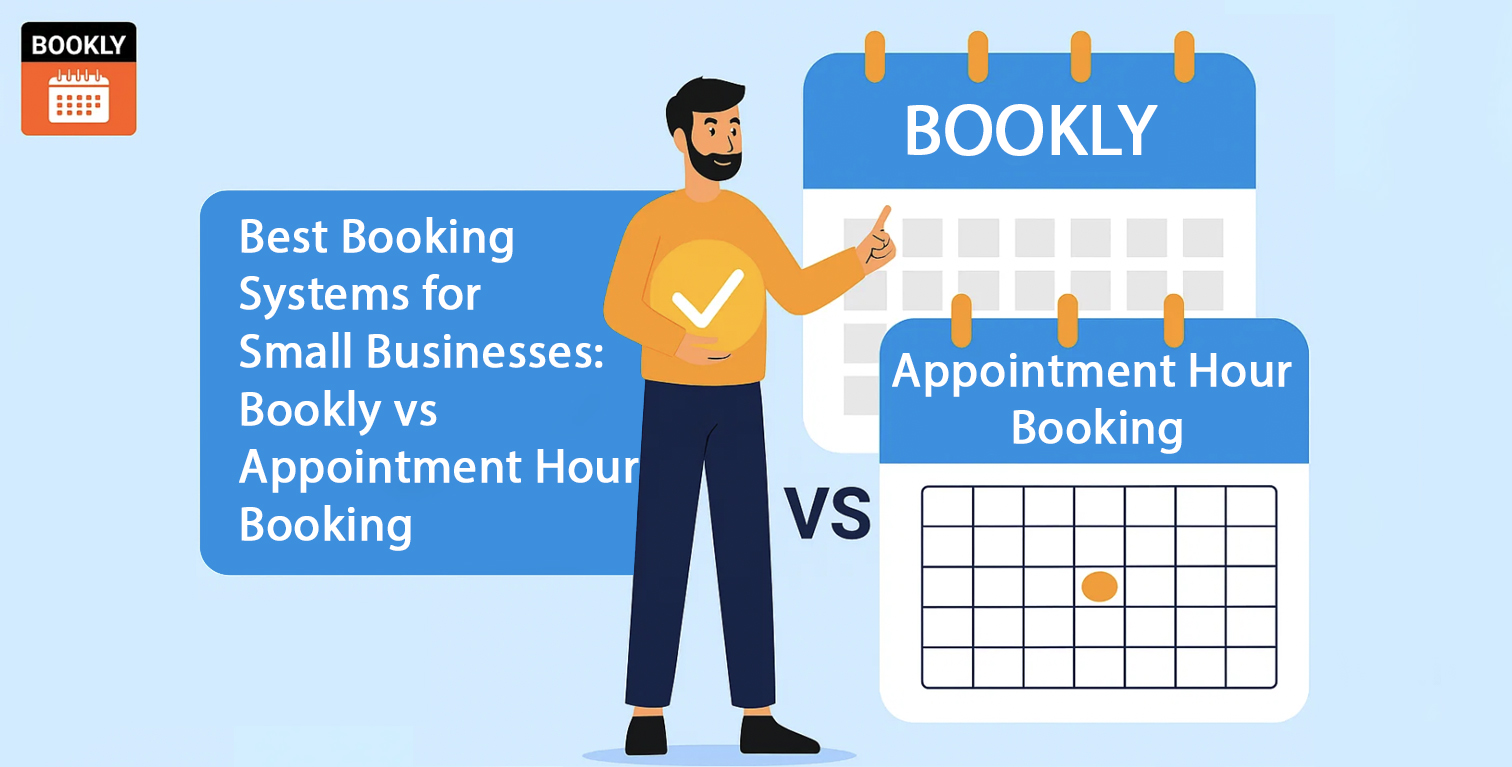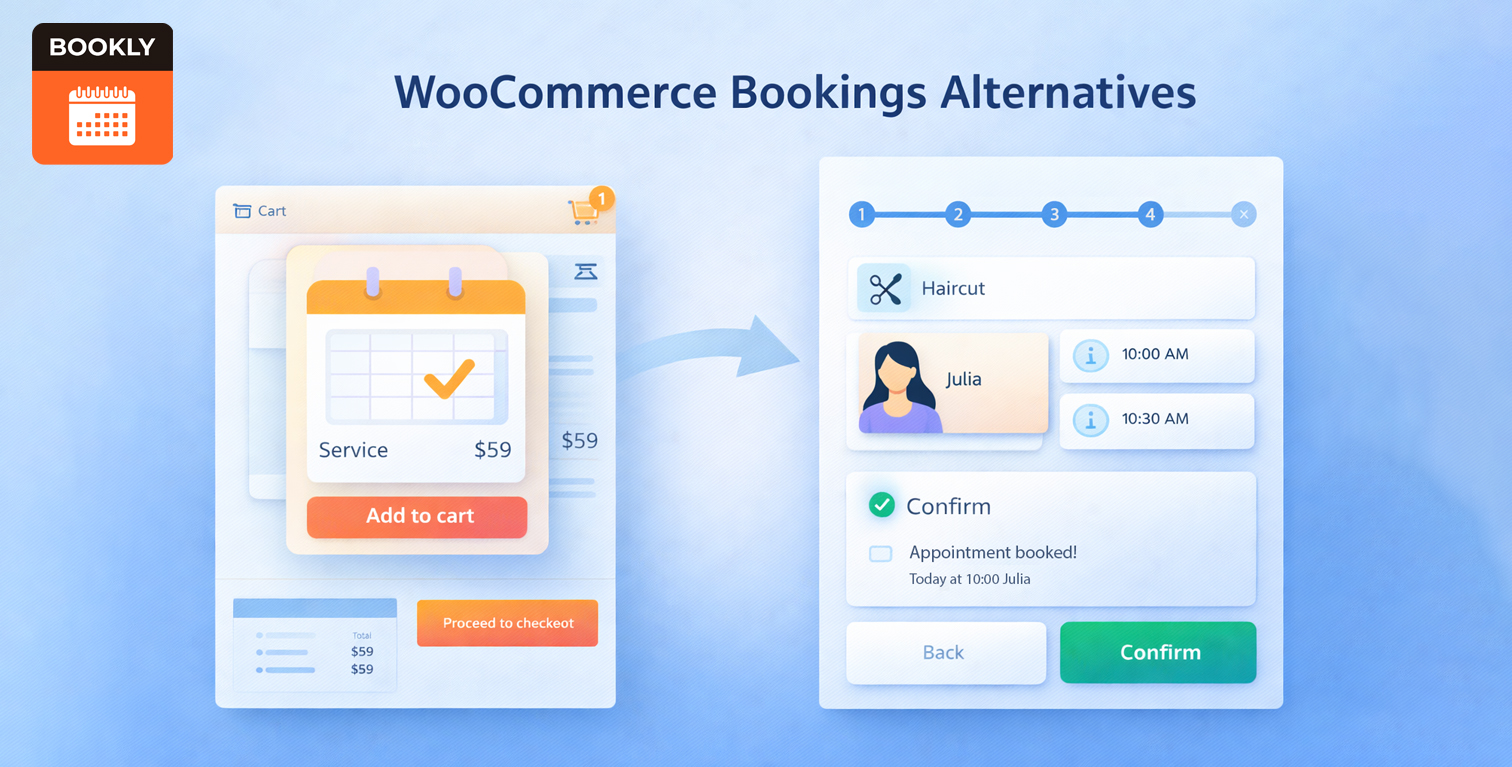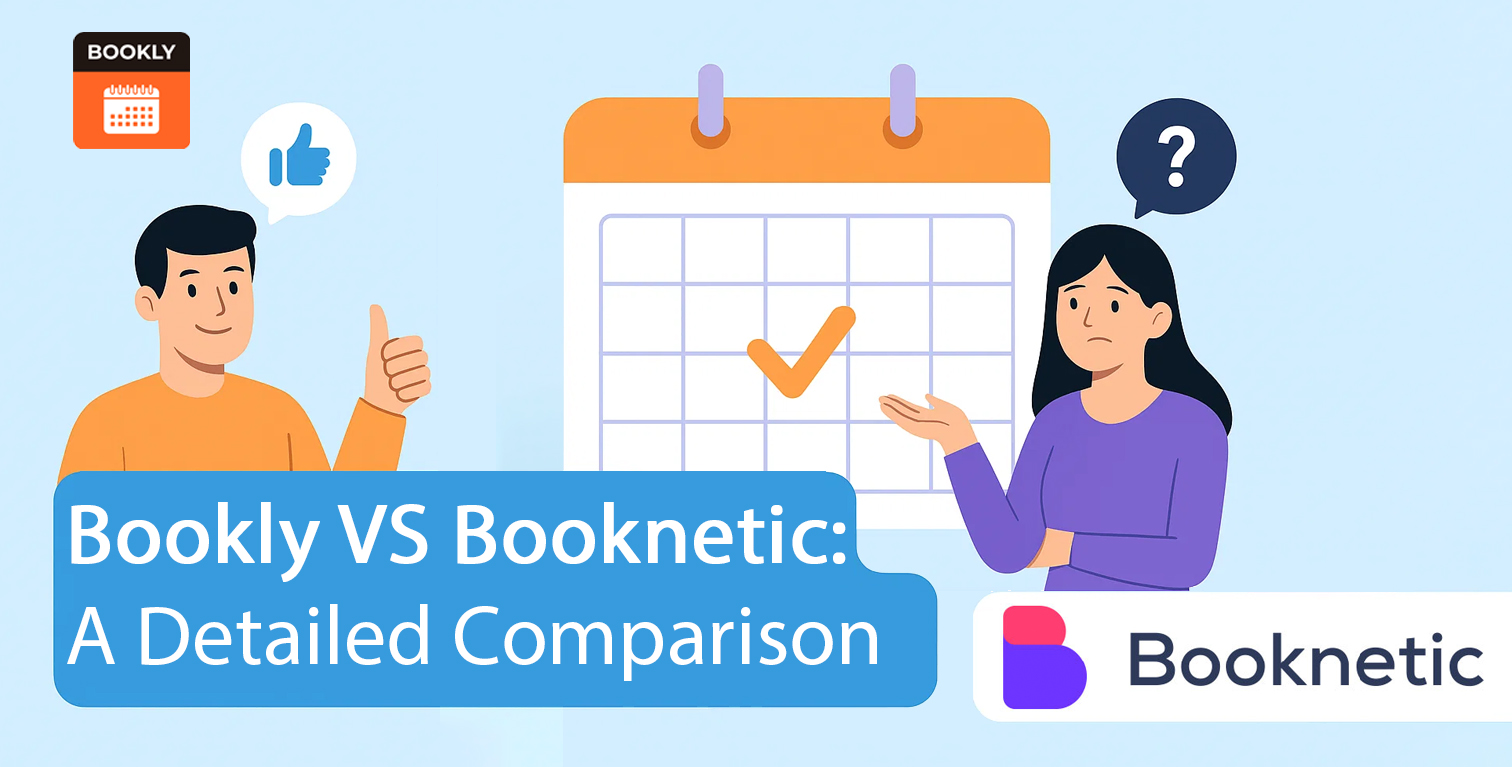
Best Booking Systems for Small Businesses: Bookly vs. Appointment Hour Booking (2025 Guide)
Picking a booking plugin is hard. You want reliability, clean design, and fewer customer no-shows, without a dedicated tech specialist to be there to manage plugin settings all day. This guide examines Bookly vs Appointment Hour Booking for small businesses and solo providers. You will see how they differ in cost, features, integrations, and daily workflows.
Later, we also look at Appointment Hour Booking vs Bookly from a pricing and support perspective. Both plugins turn your WordPress site into a self-serve scheduling system. Customers choose a service, pick a time, enter details, and receive confirmations. You see bookings in a calendar, collect payments if needed, and automate reminders.
The purpose of this Appointment Hour Booking versus Bookly comparison article is simple: help you pick the plugin that fits your business, your team, and your budget based on a clear, practical comparison.
Overview of Bookly and Appointment Hour Booking
Bookly is a mature WordPress booking system with a polished step-by-step front-end and strong back-end controls. It shines with multi-staff calendars, granular schedules, and a mobile-ready booking flow. It suits salons, clinics, trainers, tutors, consultants, agencies, and multi-location teams that want staff availability, flexible pricing, and a modern experience.
Appointment Hour Booking (AHB) is a flexible time-slot generator that excels when services have fixed durations. It offers visual control over availability, multiple services per calendar, and generous free functionality, with broader integrations in paid tiers. It fits solo providers, simple clinics, educators, coaches, room or equipment reservations, and teams that prefer a “duration defines the slot” model.
If you are comparing Appointment Hour Booking and Bookly, keep one big idea in mind: Bookly is staff-centric by default, while AHB is duration-centric by design. That single distinction influences setup, scaling, and day-to-day use.
Pricing and Value Proposition
- Bookly follows a freemium path. Test the free version to validate the flow, then upgrade to Bookly Pro when you are ready. Pro is available at $33 per year or $99 lifetime for one domain, and you can add optional modules only when you need them, for example, deposits, packages, custom fields, or extra payment gateways. You control your spending as features become necessary. This is the angle we evaluate in Appointment Hour Booking vs Bookly pricing discussions.
- Appointment Hour Booking starts free as well. Premium tiers bundle the visual form builder, online payments, Google Calendar two-way sync, WooCommerce, Zoom, SMS gateways, webhooks, Mailchimp or CRM connectors, and more. Pricing is published in euros: Basic €59 per year (or €6.99 monthly), Professional €118 per year for one website (or €13.99 monthly), and Developer €177 per year for up to five websites (or €20.99 monthly). If you prefer unlocking many integrations at once for a predictable fee, the bundled approach is attractive.
Practical takeaway: If you need a handful of extras for booking software implementation on WordPress, Bookly’s modular model can be more cost-friendly over time. If you want a broad toolkit unlocked immediately, AHB’s paid plans pack in a lot with one subscription.
Features and Functionality
Let’s map Appointment Hour Booking vs Bookly features to real tasks. Both cover the fundamentals: appointment types, buffer times, blackout dates, confirmations, cancellations, and CSV export. The differences show up in staff management, slot logic, and advanced workflows.
- Bookly strengths: Multi-staff and multi-location are native. Each employee can have unique hours, breaks, and pricing. The front-end wizard is linear and fast: pick service, pick staff, pick time, enter details, confirm. For events, the same guided flow applies, with Events booing form that keeps attendees on track from selection to confirmation. The admin calendar is color-coded, filterable by staff and service, and quick to edit. More than 40 add-ons expand into deposits, prepaid packages, waiting lists, service chains, custom fields, and more.
- AHB strengths: Time slots are generated by service durations and capacity. You define open hours, holidays, and exceptions with clarity. Each service can carry its own length and price on the same calendar. The paid visual form builder lets non-coders add fields easily. Premium tiers include many integrations out of the box, plus iCal feeds for interoperability.
Scalability and Flexibility
- Bookly. Bookly scales naturally with growing teams. Staff and calendars are first-class, so you can add providers, set individual hours and breaks, map each person to Google Calendar, and keep schedules clean as locations multiply. As you expand, features like service categories, packages, and waiting lists help with capacity, while roles and permissions keep workflows tidy for reception, managers, and providers.
- Appointment Hour Booking. AHB scales cleanly for solo operators and shared resources, especially when duration-driven slots are the core logic. You can define availability rules, capacity, holidays, and exceptions per service, then replicate those patterns across calendars for rooms or equipment. This difference sits at the heart of Appointment Hour Booking vs Bookly pros and cons, because your operational model, staff-first or duration-first, determines which strengths matter most.
User Experience and Interface
- Customer flow: Bookly’s guided wizard keeps choices simple and fast, which reduces cart abandonment on phones. AHB shows a clear calendar of available days and times after a service is selected, which many customers appreciate for transparency.
- Admin experience: Bookly emphasizes a unified calendar with filters, easy rescheduling, and structured service and staff setup. AHB emphasizes availability rules, durations, capacity, and exception handling, which power users love when they want full control at a glance.
- Customization: Bookly supports brand styling, custom fields via add-on, and block or shortcode embeds anywhere on your site. AHB’s premium form builder lets you shape fields without code, and both support custom CSS and translations.
Integration Capabilities
- Payments: Both support online payments. Bookly has Stripe and offers alternative gateways in core or via add-ons, and can route bookings through WooCommerce if you prefer a cart. AHB premium includes PayPal, Stripe, several regional gateways, and a WooCommerce bridge.
- Calendars: Both offer two-way Google Calendar sync. Bookly’s per-staff calendar mapping is convenient in multi-employee shops. AHB also exposes iCal feeds to feed other calendar tools.
- Notifications: Email confirmations and reminders are standard in both. Bookly adds an integrated SMS service or add-ons for other channels. AHB uses Twilio or Clickatell for SMS, with reminder timing controls and follow-ups.
- Marketing and automation: Bookly connects to popular tools through add-ons and third-party bridges, with a large tutorial ecosystem that makes custom automations approachable. AHB premium includes webhooks for Zapier, Mailchimp, Salesforce, Zoom, and more, which reduces extra purchases and speeds up automation.
Customer Support and Resources
- Bookly offers a full knowledge base, FAQs, video walkthroughs, responsive ticket human support for paying users, and an extensive community of third-party tutorials. The support team remains active and helpful, and the large user base means answers are easy to find.
- Appointment Hour Booking provides documentation, examples, and ticket support for paid customers, along with a WordPress.org forum presence. Updates are frequent, and the docs are clear once you learn the duration-driven scheduling model.
If you still need clarity after comparing Appointment Hour Booking and Bookly in this guide, try Bookly or install both free editions on a staging site, create identical services, and simulate a week of bookings. Hands-on testing answers questions faster than any spec sheet.
Side-by-Side Bookly vs Appointment Hour Booking Plugin Comparison Table
For a quick Appointment Hour Booking and Bookly comparison, scan this grid that summarizes pricing models, staff tools, calendar options, payments, notifications, and more. It also highlights the key differences between Appointment Hour Booking and Bookly, giving you enough context to judge fit at a glance for your team, your workflow, and your growth plans.
| Area | Bookly | Appointment Hour Booking |
| Free version | Trial basic flow, limited features | Generous free tier for solo use and simple calendars |
| Pricing model | Paid core, optional add-ons, one-time Pro licenses with optional renewals | Free tier plus paid tiers that bundle most integrations |
| Staff management | Native multi-staff, per-staff schedules | No native staff selector, use separate calendars per staff or location |
| Service setup | Categories, durations, staff assignment, packages, chains | Service duration generates slots, per-service capacity, and price |
| Front-end UX | Several designs of the booking widget, app-like and fast on mobile | Calendar with visible availability, template-driven look |
| Admin UX | Unified calendar, filters, quick edits, structured setup | Powerful availability rules, exceptions, holidays, lead times |
| Payments | Core and add-on gateways, WooCommerce integration | PayPal and Stripe in premium, regional gateways, WooCommerce bridge |
| Calendar sync | Two-way Google Calendar per staff, iCal support | Two-way Google Calendar, iCal feeds for other apps |
| Notifications | Email plus integrated SMS or channel add-ons | Email plus Twilio or Clickatell SMS, follow-ups, and timing controls |
| Marketing & CRM | Add-ons and third-party bridges, large tutorial ecosystem | Built-in webhooks in premium, Mailchimp, Zapier, Salesforce, Zoom |
| Custom fields | Add-on for advanced fields, brand styling | Visual form builder in premium, custom fields without code |
| Reports | Booking lists, export, and add-ons for analytics | Booking lists, CSV export, printable schedules |
| Multilingual | Translatable, works with major translation plugins | 50+ interface languages, flexible date/time formats |
| Learning curve | Light for basics, grows with add-ons | Slightly higher at first due to many availability toggles |
| Best fit | Multi-staff teams, polished UX, modular growth | Solo providers, shared resources, duration-driven schedules |
Final Verdict
If your business runs on individual providers with distinct calendars, choosing between Appointment Hour Booking and Bookly often hinges on staff views and the front-end experience your clients see every day. Bookly feels fast, handles multi-staff schedules with fewer clicks, and keeps customers in a single, smooth flow from service to confirmation. That matters in salons, clinics, and studios where customers now expect a modern booking journey on mobile.
If your schedule logic starts with service duration, Appointment Hour Booking vs Bookly becomes a question of availability control. AHB lets you sculpt open hours, holidays, exceptions, capacity, and lead times with precision. You get a transparent calendar that shows exactly what is open, and premium tiers unlock a long list of integrations immediately.
Budget is straightforward. In Appointment Hour Booking vs Bookly pricing, Bookly’s modular add-ons can keep your initial spend lean, then expand only as needs expand. AHB’s paid plans aim for predictability by bundling many integrations. Neither model is inherently “cheaper,” the right choice is the one that keeps your must-have features unlocked without paying for tools you will not use.
Finally, remember your customers do not care which plugin you install. They care that the form loads quickly, shows real availability, accepts payment without friction, and sends clear confirmations and reminders. The best way to decide is to compare Appointment Hour Booking and Bookly on a staging site with two identical services, then ask a colleague to book on the phone. That short test will reveal which flow feels effortless for your team and your clients.
Ready to explore? Install Bookly for free and try its Pro add-ons, or launch the Bookly demo and choose the plan that fits your needs on their site.






